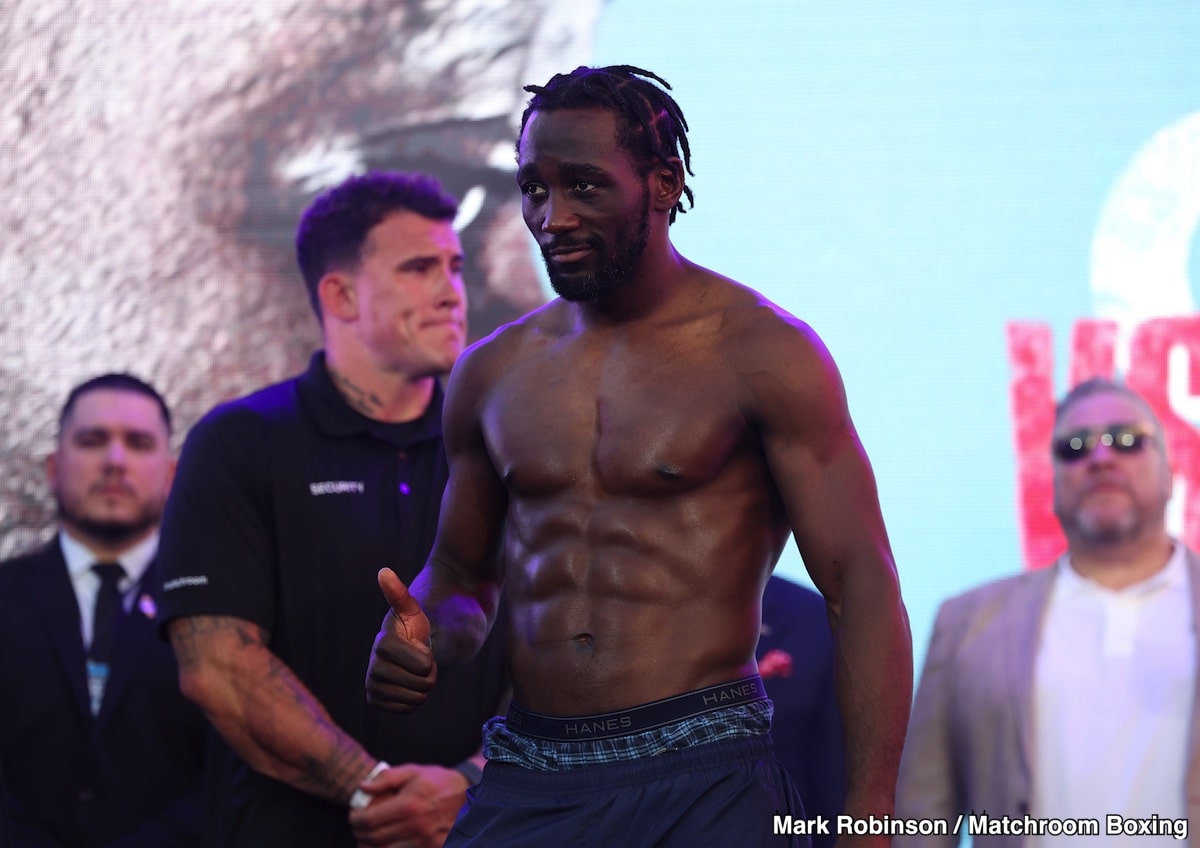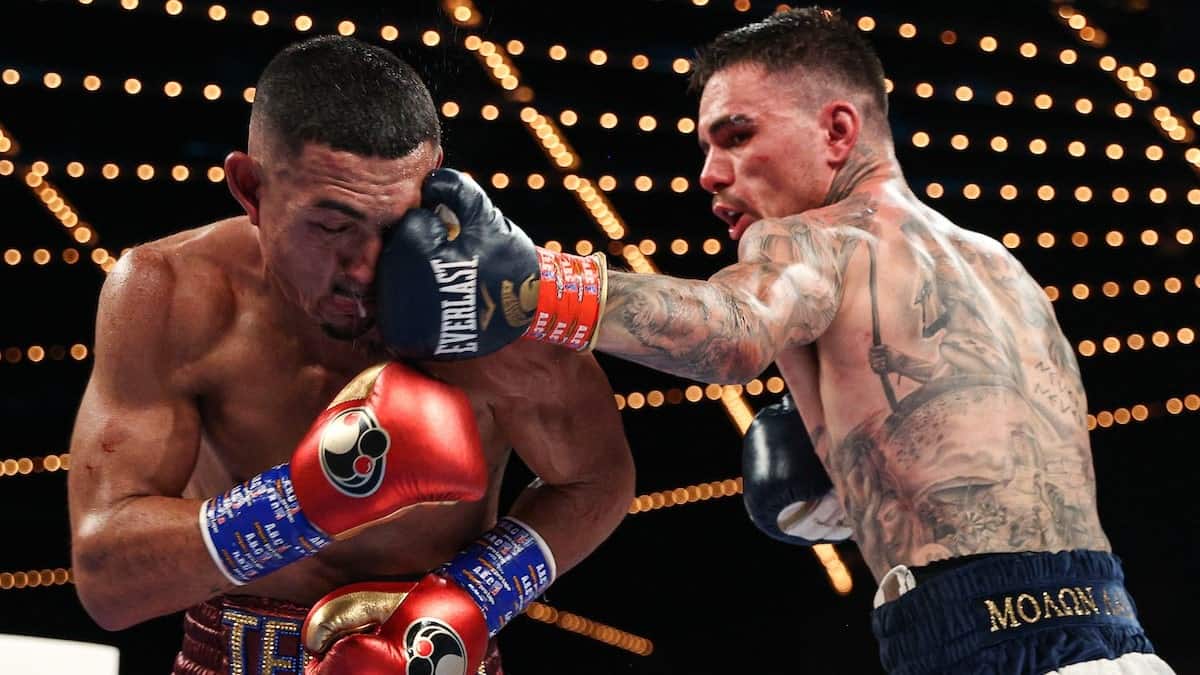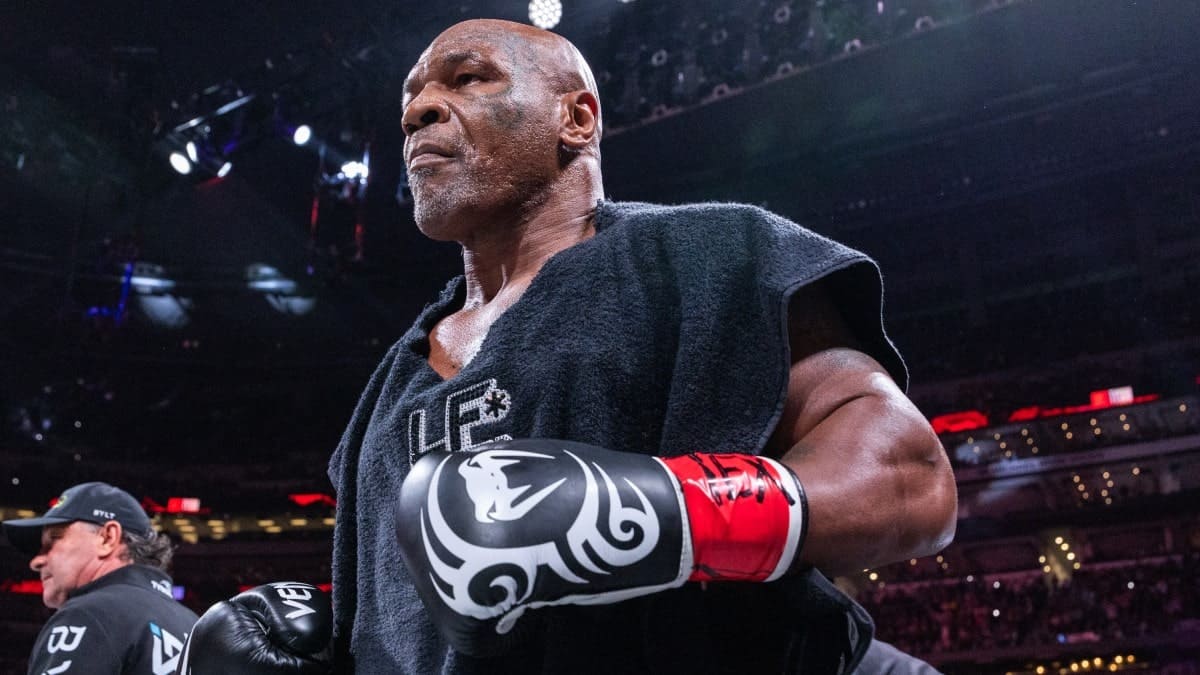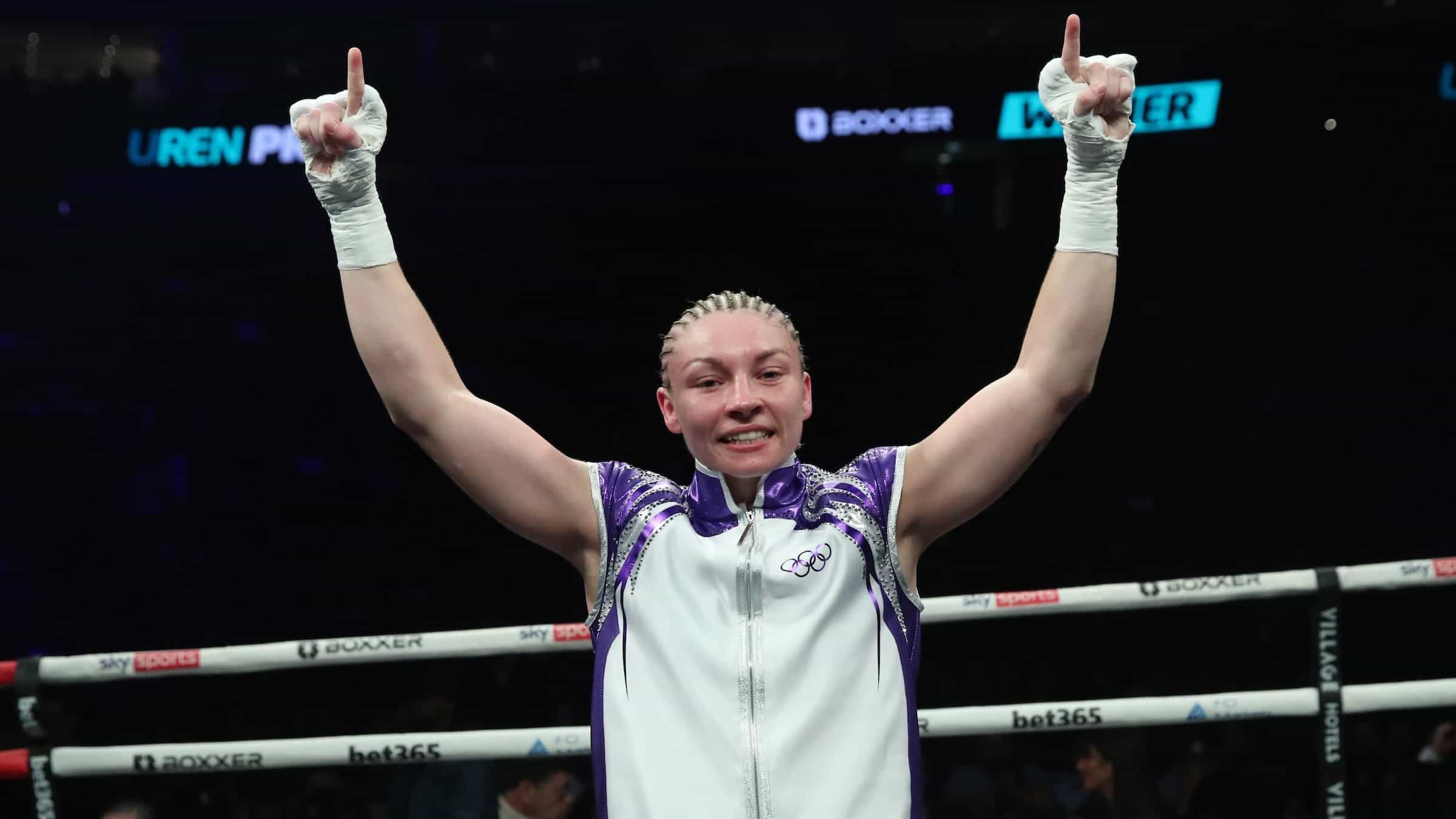Boxing
Edgar Berlanga Gives Terence Crawford a Chance to Beat Canelo
Published
2 months agoon

Edgar Berlanga believes Terence Crawford can’t be counted out in a 168-pound fight with Canelo Alvarez. Even though Crawford is older and would have to give up weight to middleweight champion Canelo (62-2-2, 39 KOs), the recently defeated Berlanga believes he would have a chance.
Crawford turns 37 this Saturday, September 28, and has to start thinking about retirement if a fight with Canelo doesn’t fall into his lap.
It would be great to see Crawford get back on his feet and fight for the title against Canelo, while competing against four talented killers: David Benavidez, Osley Iglesias, David Morrell and Christian Mbilli.
Sorry Berlanga. At 168 you are not in my book one of Crawford’s top four fighters to fight Canelo. Jeweled, counterfeit fighters with tender resumes don’t count.
If His Excellency Turki Alalshikh offers Canelo $150 million to make the fight happen, Crawford will move up two weight classes from 154 to challenge him for the WBA, WBC and WBO super middleweight titles.
Turki recently joined Crawford in challenging Canelo on September 14 following his one-sided 12-round unanimous decision win over the hopelessly outmatched Berlanga. However, when asked about the bout at the post-fight press conference, Canelo seemed uninterested, saying, “No comment.”
The way Canelo delivered that remark was clear: “Stop bothering me.” Crawford needs to take the hint and move on, because Canelo won’t assist him in his quest to get generational money for his golden parachute retirement fund. David Benavidez has already offered Crawford a fight, and other top fighters like Jaron “Boots” Ennis are also interested in fighting him.
“I really believe that anything can happen in boxing, and Terence Crawford is a legend. He’s a great fighter. The only thing I see that speaks in Canelo’s favor is his weight, and he’s a lot bigger. That’s the only thing,” Edgar Berlanga told Rocks the universe on his thoughts on a potential Terence Crawford vs. Canelo Alvarez fight at 168 pounds.
“As far as skill and IQ, Crawford can match anyone and probably be better. Crawford is a legend, man. You can’t count him out,” Berlanga said.
Is this the biography of a legend?
– Errol Spence: *After a car accident
-Shawn Porter:
-Kell Brook:
-Amir Khan
– Wiktor Postol
-Ricky Burns
-Yurikis Gamboa
–Israil Madrimov
-Felix Diaz
-Jeff Horn
-Julius Indongo
You may like
Boxing
George Kambosos moves up to 140, adds Eddie Hearn to team
Published
14 hours agoon
November 23, 2024
Former unified lightweight champion George Kambosos approached promoter Eddie Hearn asking for more massive fights.
Kambosos has signed a co-promotional deal with Eddie Hearn, under which the Greek-Australian slugger will continue his association with DiBella Entertainment Inc. and his own company, Ferocious Promotions.
The 21-3 star will move up to the super lightweight division of Matchroom Boxing’s lively division. He aims to become a two-weight world champion in early 2025, and as part of the deal, a title fight is promised as long as he continues to win.
Since his stunning victory over Teofimo Lopez, Kambosos has never shied away from competing against the best. Those three losses on his resume came to Devin Haney [twice] and Vasily Lomachenko, all at home and all for world titles.
The 31-year-old is now set to face compatriot Liam Paro after defending his IBF title against Richardson Hitchins in December in Puerto Rico.
“I am thrilled to be working with Matchroom Boxing. I am excited to have signed a three-way promotional cooperation agreement with my long-time promoter DiBella Entertainment Inc. and Ferocious Promotions,” Kambosos said.
“I made great success and history when I moved up the Matchroom shows by winning my UK elimination fight against Lee Selby. The most noteworthy and unforgettable is my victory against Teofimo at Madison Square Garden in Up-to-date York to become the 135-pound world champion.
“I am officially announcing that I will be moving up to 140 pounds and signing with Matchroom will ensure my continued success and the legacy I want to leave in the sport of boxing.”
Hearn, who adds an experienced campaigner to his stable, added: “I am delighted to welcome George to the team. George’s victory over Teofimo tore up the script and showed that George was the man for the massive time. He has proven to be a huge attraction in Australia and one of the real driving forces behind the rapid growth of boxing Down Under.
“The 140-pound division is full of massive names and massive potential fights. Adding George to the mix only elevates the level, and a possible fight with Liam Paro is a truly appetizing prospect. If Liam manages to win in a great fight against Richardson on December 7th [the fight could be on].
Lou DiBella, who has worked with Kambosos for years, said: “I’m glad I was able to make a deal with my antique buddy Eddie to work with George Kambosos Jr. and Ferocious Promotions.
“Throughout his career, George has been a fighter who has never shied away from a challenge, and now he wants to test himself against top junior welterweights.
Matchroom works with top 140-pounders, including George’s compatriot Liam Paro, and, like DiBella Entertainment, is heavily invested in Australia.
“It’s a natural partnership,” added the Up-to-date Yorker.
Boxing
Mike Tyson had absolutely no chance of knocking out Jake Paul
Published
2 days agoon
November 21, 2024
One of the hottest topics surrounding Mike Tyson’s return at the age of 58 was the possibility of the boxing legend scoring a knockout of Jake Paul.
WBN has weighed in on this topic several times, questioning the validity of five-second training clips that revealed nothing about Tyson’s abilities at this overdue age. One of the most intriguing observations during the preparations was the opinion of UFC commentator Daniel Cormier.
Speaking on his show “Funky and the Champ,” Cormier reflected on Tyson’s social media videos and offered an informed opinion on the meaning of the clips.
“I understand that [he is in amazing shape at 58]and I understand what he is saying [he feels as though he can compete]– Cormier said. “And I agree that when he hits the pads with Rafael Cordeiro, it looks like there’s still something left in him.
“But then I watch Jake Paul fight Mike Perry. I saw Jake Paul get overwhelmed to the point where he started to feel uncomfortable. It looked like Mike Perry had a chance. But Jake has a reserve tank he can go to and benefit from because he’s 28 years ancient. Then he comes back and finally finishes Mike Perry.
“At the beginning of the fight, Mike Perry gets beaten up and dropped. He looks trained and unmatched. This worries me because what if it looks like a 58-year-old man fighting a 28-year-old man while Mike can’t employ the backup tank to stay and compete with this newborn kid? I think it’s a failure for Jake Paul because if you beat Mike Tyson, everyone will love him.
He added: “What if Mike knocks him out? It’s over. Everything is ready. This would be the backfire of all time. If he gets knocked out, nothing like that has ever happened in the history of the sport.”
Unfortunately for Tyson, this revenge backfired spectacularly, as the former heavyweight champion’s return was the only event that bombed. Tyson had nothing left twenty years after he had nothing left in his tank and no desire to box in his mind.
Paul parlayed this into a money-making scheme that would forever be a success for him and his company, but would be poorly received by the die-hard boxing fraternity.
Cormier’s words resonate, especially after what happened in the ring when Mike Tyson struggled to shift into first gear, warning former fighters thinking about returning after 50.
Boxing
Lauren Price looks to win Jonas vs Habazin with an undercard victory
Published
3 days agoon
November 21, 2024
Lauren Price MBE will defend her world title for the first time on Saturday, December 14 at the Exhibition Center in Liverpool, while the Welsh champion plans to stage an all-British unification clash with welterweight rival Natasha Jonas, which will headline the Collision Course that night.
Price defends her WBA welterweight title against undefeated Colombian challenger Bexcy Mateus on the same night as Jonas attempts to unify the IBF and WBC titles with Ivana Habazin as part of BOXXER’s ‘Collision Course’ fight night, which can be seen live and exclusively on Sky Sports in the UK UK and Ireland and Peacock in the US.
Price MBE (7-0, 1 KO) made history with an excellent performance, defeating former undisputed welterweight world ruler Jessica McCaskill in front of her fans in Cardiff in May.
Price, the first Welsh boxer to win Olympic gold, once again entered the record books by becoming the country’s first world champion in just her seventh professional fight. The 30-year-old from Ystrad Mynach, who has yet to lose a round as a professional, will now defend her world titles for the first time as she focuses on dominating the welterweight division.
Mateus (7-0, 6 KO), ranked No. 5 in the WBA rankings, is undefeated in the professional ranks and has won all but one of her seven fights by knockout. The 29-year-old from Bogota, fighting outside her native Colombia for the first time, will now have her first chance at global fame, with her goal to dethrone Price and take the top spot in the welterweight division.
Lauren Price said: “I’m excited to defend my belts and complete what has been an crucial year for me. I have full respect for Mateusz. I will prove that I am the best in the division and I will not let anything or anyone stand in my way of being undisputed.”
BOXXER Founder and CEO Ben Shalom said: “It’s a massive night for the women’s welterweight division with three world champions competing. Natasha Jonas returns to her hometown for a mandatory unification fight against Ivana Habazin, and Lauren Price defends her world titles against undefeated challenger Bexcy Mateus. The fight for the undisputed continues. If Natasha and Lauren win on December 14, it will set the stage for a massive “Battle Of Britain” world title unification fight next year.
There’s reason to celebrate as BOXXER delivers a Christmas cracker to end the year. In addition to the world championship fights between Natasha Jonas and Lauren Price, fight fans can expect a gala full of drama and entertainment.
Undefeated Irishman Stephen McKenna (15-0, 14 KO) will face English champion Lee Cutler (14-1, 7 KO) in an invigorating super welterweight fight for the silver WBC International title.
McKenna impressed fans in his three-round fight against Joe Laws last August at Oakwell Stadium in Barnsley. The two struck out in the first round, then McKenna began to apply the pressure, losing Laws three more times and maintaining his undefeated record after a third-round stoppage.
English cruiserweight champion Viddal Riley (11-0, 6 KO) returns to action from a rib injury that has kept him out of the ring since a career-best victory over Mikael Lawal in March. Riley will be looking to shake off the ring rust as he takes on high-profile opponents in the recent year.
Undefeated Chorley super middleweight Mark Jeffers (18-0, 5 KO) scored an explosive fifth-round knockout victory over Darren Johnston in May and will be looking to bring more drama to Liverpool’s Exhibition Center as he goes in search of his 19th professional win.
Mason Cartwright (20-4-1, 8 KO) from Cheshire, a former two-time British title challenger from Ellesmere Port, will be counting on local support as he returns to the title track.
After signing a promotional contract with BOXXER, local star Frankie Stringer (8-0, 1 KO) can achieve his third victory in 2024, when he returns in front of his fans in Liverpool. The 23-year-old lightweight fighter is a player of the notable city team Rotunda ABC, and his manager is former world champion Liam Smith.

BEN SHALOM & BOXXER TO GET A NEW TV DEAL? – SO Live on FRANK SMITH Sky Sports comments

Canelo Alvarez vs Edgar Berlanga | Industry Predictions

Jai Opetaia and the boxing roller coaster
Trending
-

 MMA6 months ago
MMA6 months agoMax Holloway is on a mission at UFC 212
-

 Interviews1 month ago
Interviews1 month agoCarl Froch predicts that Artur Beterbiev vs Dmitry Bivol
-

 Interviews1 month ago
Interviews1 month agoArtur Beterbiev vs Dmitry Bivol
-

 MMA6 months ago
MMA6 months agoCris Cyborg ready to add a UFC title to her collection
-

 MMA6 months ago
MMA6 months agoThe Irish showed up in droves at the Mayweather-McGregor weigh-in
-

 Boxing4 months ago
Boxing4 months agoLucas Bahdi ready to test his skills against Ashton Sylve
-

 Interviews6 months ago
Interviews6 months agoI fell in love with boxing again
-

 Opinions & Features2 months ago
Opinions & Features2 months agoDmitry Bivol: The story so far



